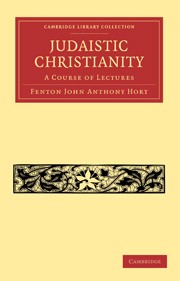Book contents
- Frontmatter
- PREFACE
- Contents
- I INTRODUCTORY LECTURE
- II CHRIST AND THE LAW
- III THE EARLY CHURCH AT JERUSALEM
- IV THE CHURCH OF ANTIOCH
- V THE INDEPENDENT ACTIVITY OF ST PAUL
- VI ST PAUL AT JERUSALEM AND THE EPISTLES OF THE ROMAN CAPTIVITY
- VII THE PASTORAL EPISTLES
- VIII JAMES, I PETER, HEBREWS, APOCALYPSE
- IX THE CHURCH OF JERUSALEM FROM TITUS TO HADRIAN
- X THE JUDAIZERS OF THE IGNATIAN EPISTLES
- XI CERINTHUS, ‘BARNABAS,’ JUSTIN MARTYR
- XII PALESTINIAN EBIONITES
- APPENDIX
- INDEX
III - THE EARLY CHURCH AT JERUSALEM
Published online by Cambridge University Press: 07 September 2011
- Frontmatter
- PREFACE
- Contents
- I INTRODUCTORY LECTURE
- II CHRIST AND THE LAW
- III THE EARLY CHURCH AT JERUSALEM
- IV THE CHURCH OF ANTIOCH
- V THE INDEPENDENT ACTIVITY OF ST PAUL
- VI ST PAUL AT JERUSALEM AND THE EPISTLES OF THE ROMAN CAPTIVITY
- VII THE PASTORAL EPISTLES
- VIII JAMES, I PETER, HEBREWS, APOCALYPSE
- IX THE CHURCH OF JERUSALEM FROM TITUS TO HADRIAN
- X THE JUDAIZERS OF THE IGNATIAN EPISTLES
- XI CERINTHUS, ‘BARNABAS,’ JUSTIN MARTYR
- XII PALESTINIAN EBIONITES
- APPENDIX
- INDEX
Summary
The final injunctions of the Risen Lord
Two of the Gospels in their genuine texts record The final injunctions of our Lord to the Eleven, with or without other disciples, with explicit reference to the universality of their mission. In St Matthew we read “All authority is given Me in heaven and on earth: go ye therefore (since the authority of Messiah on earth was not partial or national only, but universal), go ye therefore and bring all the nations into discipleship (µαθητεύσατε πάντα τὰ ἔθνη)”. And an echo of this form of the command is preserved in the appendix to St Mark, “Go ye (πορενθέντες, as in St Matthew) into all the world and proclaim the Gospel to the whole creation”. In St Luke the charge is developed further, “And that repentance and remission of sins should be preached in His name unto all the nations, beginning from Jerusalem. Ye are witnesses of these things”, and again “but tarry ye in the city until ye be clothed with power from on high”. Here the ultimate sphere, all the nations, and the immediate sphere,—sphere as well as starting-place, as ἀρξάµενοι implies,—viz. Jerusalem, are brought out with equal distinctness. The only condition for the transition from the one sphere to the other is the having been clothed with power from on high. In the last words of the Gospel we read that as the Lord parted from the disciples, “they worshipped Him, and returned to Jerusalem with great joy, and were continually in the temple, blessing God”.
- Type
- Chapter
- Information
- Judaistic ChristianityA Course of Lectures, pp. 39 - 60Publisher: Cambridge University PressPrint publication year: 2009First published in: 1894



